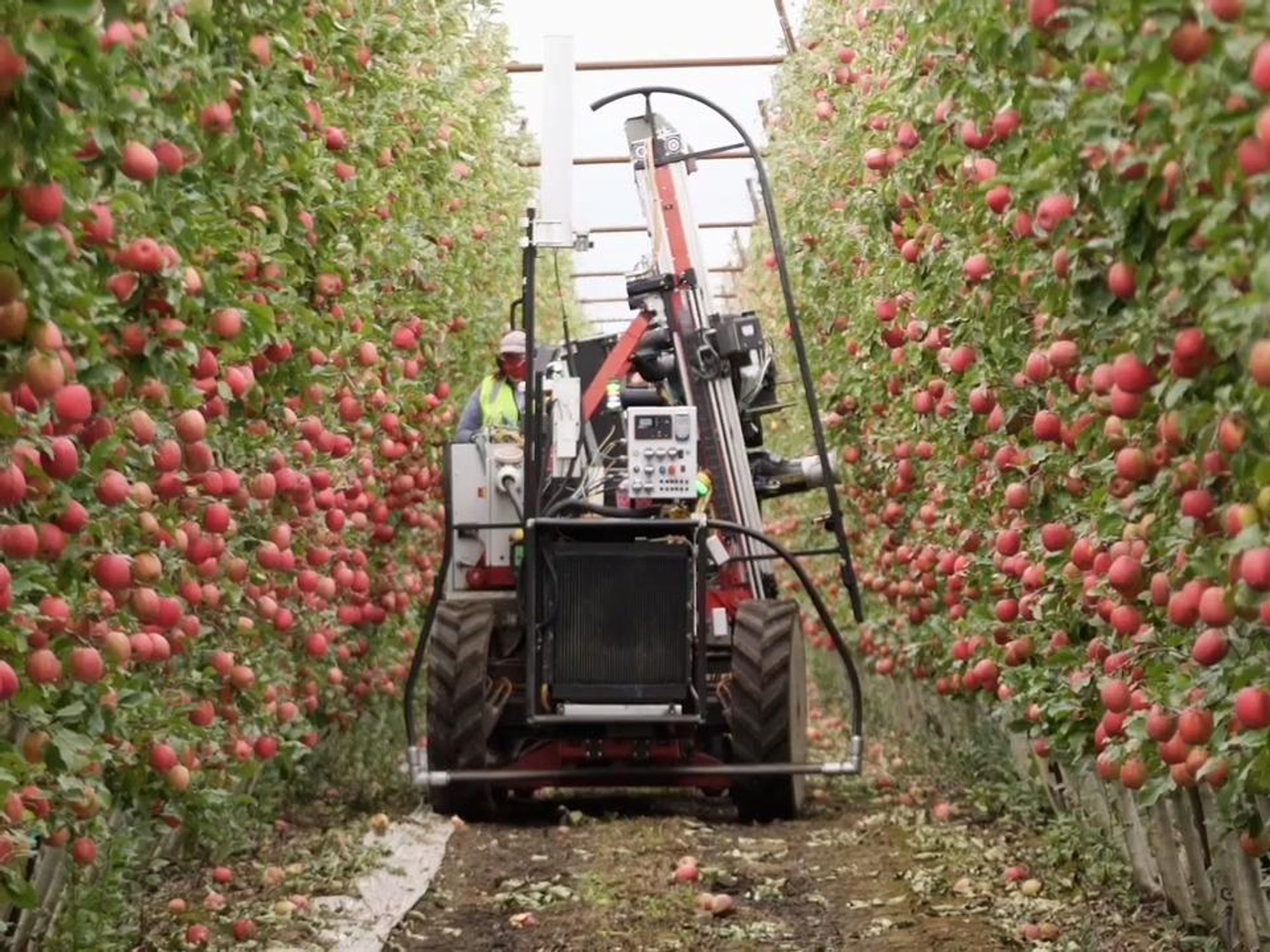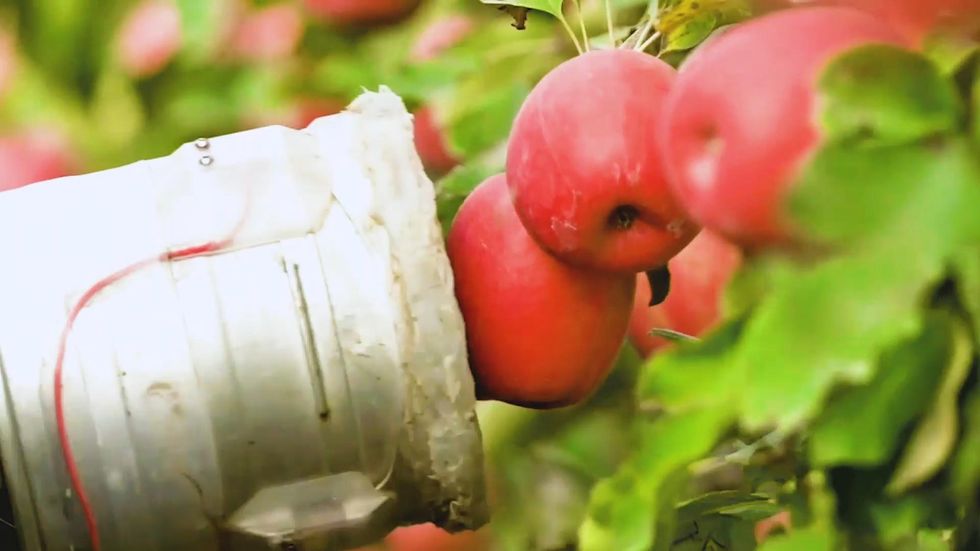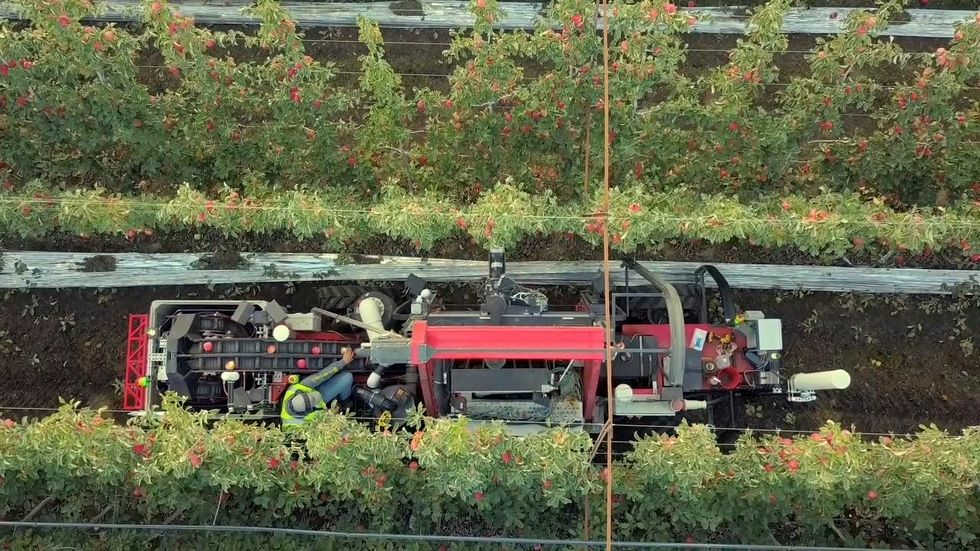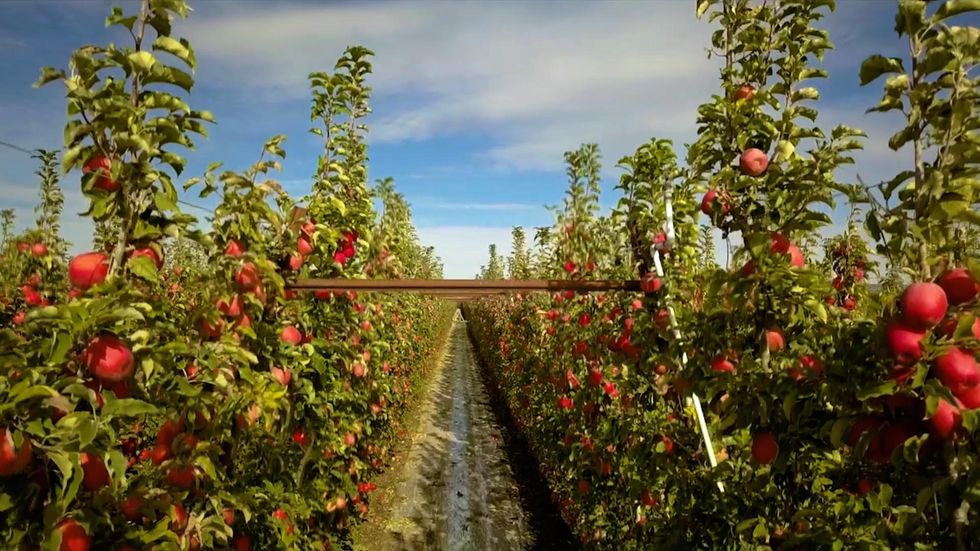Subscribe for free to finish this article!
Join tens of thousands of other founders, investors, and operators who subscribe to dot.LA for the most important tech news in their inbox 2x a week.
Get access to

Get in the KNOW
on LA Startups & Tech
XJoin tens of thousands of other founders, investors, and operators who subscribe to dot.LA for the most important tech news in their inbox 2x a week.
Get access to
David Shultz reports on clean technology and electric vehicles, among other industries, for dot.LA. His writing has appeared in The Atlantic, Outside, Nautilus and many other publications.

As part of its effort to “disrupt” the food industry supply chain, Santa-Monica based automation incubator Wavemaker Labs has added—and revived—a new piece of technology that promises to change the game for apple orchards.
In October, Wavemaker acquired the intellectual property behind agtech startup Abundant Robotics’ autonomous apple-picking technology. Wavemaker is now relaunching the technology under the name Abundant Robots and taking aim at a major segment of the agriculture industry—one that generates around $5 billion annually for American apple farmers, according to the U.S. Department of Agriculture.
Hayward, Calif.-based Abundant went under last year, citing difficulties “develop[ing] the market traction necessary to support its business during the pandemic.” Despite that failure, Wavemaker Labs founder and CEO Buck Jordan was convinced that the technology behind Abundant was solid, even if the startup’s execution ultimately failed.
“COVID essentially just killed their harvest season and killed the progress they needed to make in order to get the next round of financing,” Jordan told dot.LA. “[Abundant] kind of had to invent everything from scratch, and they’ve done a really great job. But there’s a lot of [technology] that’s cheaper off the shelf that can be used and swapped in.”

Jordan, who is fond of statistics, notes that around 87 million metric tons of apples are produced globally each year—making it “far and away, in terms of tree fruit, the biggest category that there is.” He adds that harvesting labor accounts for roughly two-thirds of the cost that consumers pay for an apple at the grocery store, with farming costs only projected to grow in the coming years.
This is where Wavemaker sees the opportunity for Abundant Robots. The IP it acquired essentially constitutes a vacuum-suction apple-harvesting system that operates in tandem with AI-backed image recognition software. In other words, the robot can eye an apple tree and suck the ripe apples right off the branch.
The delicate nature of the suction technology was a key selling point for Wavemaker. “[With] apples, you’ve got to be really ginger with them,” Jordan said. “If you bruise an apple, the value of that particular apple goes down—and now it’s applesauce instead of being sold in Whole Foods.”
Abundant Robots is now looking to raise $20 million via crowdfunding to improve on its existing prototype. If it hits its goals, the next iteration of the machine should cost under $100,000 to produce and be able to pick an apple every one-to-1.5 seconds. That’s likely quicker than even the fastest human pickers, according to Jordan—and of course, the machine never gets tired.
Abundant’s technology may be good news if you’re an apple grower, but probably not if you’re an apple picker. Aviva Chomsky, a professor at Salem State University in Massachusetts who studies immigration and migrant labor in the U.S., believes that automation will likely exacerbate power imbalances between agricultural workers and their employers.

“In an ideal socio-economic system, technologies could be used for the benefit of the many—but in our agricultural system, technologies are generally used for the benefit of the few and to the detriment of the many,” Chomsky told dot.LA.
While Wavemaker and others in the autonomous agriculture space are positioning their platforms as solutions to an ongoing labor shortage, labor advocates say their technologies could prove disastrous for America’s roughly 2.5 million farm workers and its rural farming communities.
“There is what I perceive to be a very insincere narrative—or perhaps more graciously, an incomplete narrative—about what’s really happening,” according to Erik Nicholson, a consultant and former national vice president of the United Farm Workers labor union. “That, to me, is about as sincere as saying Facebook is about connecting friends and family.”
Like Facebook, Nicholson thinks much of the actual value in technology like Abundant Robots’ machines will come from data collection. As tech companies are able to put more intelligent machinery on farms, they’ll be able to collect data on elements such as soil moisture, crop productivity and temperature.

How tech companies choose to leverage that data remains to be seen. They could provide farmers with insights into how to grow more crops in a more efficient and sustainable manner. Nicholson, however, expects that the trend toward automation will come at a cost to farmers.
“Whoever writes the algorithms and has access to the data has tremendous power,” he said. “Do we want to just hand that over to the VCs in Silicon Valley and say they’re going to make the determinations about what’s growing, how and when?”
Critics agree that there’s no easy solution that simultaneously keeps food prices low, saves growers from going bankrupt and pays farmworkers a living wage. Yet as automotion promises to upend the agriculture industry’s status quo, they argue that farm workers at least deserve a seat at the table as billions in investment capital pour into the industry.
Otherwise, Nicholson said he fears that “we’re going to see an ongoing extraction of wealth into the hands of investors—who largely do not live in [farming communities like] Mabton, Wash. or Delano, Calif.”
David Shultz reports on clean technology and electric vehicles, among other industries, for dot.LA. His writing has appeared in The Atlantic, Outside, Nautilus and many other publications.
Samson Amore is a reporter for dot.LA. He holds a degree in journalism from Emerson College. Send tips or pitches to samsonamore@dot.la and find him on Twitter @Samsonamore.
According to a Forbes report last April, both the viewership and dollars behind women’s sports at a collegiate and professional level are growing.
In 2022, the first 32 games of the NCAA tournament had record attendance levels, breaking records set back in 2004, and largely driven by the new and rapidly growing women’s NCAA tournament. WNBA openers this year saw a 21% spike in attendance, with some teams including the LA Sparks reporting triple-digit ticket sales growth, about 121% over 2022’s total. In 2023, the average size of an LA Sparks crowd swelled to 10,396 people, up from 4,701 people.
Women make up half the population, but “also 50% of the folks that are walking into the stadium at Dodger Stadium, or your NFL fans are just about 50% women,” noted Erin Storck, a panelist and senior analyst at Los Angeles-based Elysian Park Ventures.
Storck added that in heterosexual households, women generally manage most of the family’s money, giving them huge purchasing power, a potential advantage for female-run leagues. “There's an untapped revenue opportunity,” she noted.
In the soccer world, Los Angeles-based women’s soccer team Angel City FC has put in the work to become a household name, not just in LA County but across the nation. At an LA Tech Week panel hosted by Athlete Strategies about investing in sports, Angel City head of strategy and chief of staff Kari Fleischauer said that years before launching the women’s National Women’s Soccer League team, Angel City FC was pounding the pavement letting people know about the excitement ladies soccer can bring. She noted community is key, and that fostering a sense of engagement and safety at the team’s home venue, BMO stadium (formerly Banc of California Stadium), is one reason fans keep coming back.
Adding free metro rides to BMO stadium and private rooms for nursing fans to breastfeed or fans on the spectrum to avoid sensory overload, were just some of the ways ACFC tried to include its community in the concept of its stadium, Fleischauer said. She noted, though, that roughly 46% of Angel City fans are “straight white dudes hanging out with their bros.”
“Particularly [on] the woman's side, I'd like to think we do a better job of making sure that there's spaces for everyone,” Fleischauer told the audience. “One thing we realize is accessibility is a huge thing.”
Samson Amore is a reporter for dot.LA. He holds a degree in journalism from Emerson College. Send tips or pitches to samsonamore@dot.la and find him on Twitter @Samsonamore.
L.A. Tech Week has brought venture capitalists, founders and entrepreneurs from around the world to the California coast. With so many tech nerds in one place, it's easy to laugh, joke and reminisce about the future of tech in SoCal.
Here's what people are saying about the fifth day of L.A. Tech Week on social:
#LATechWeek has been on 🔥🔥🔥. Yes the events are super cool at amazing venues. But, I’m blown away by the people. I’ve met so many founders building generative AI companies from the ground up. I’m so bullish on LA right now🥳. LA is for builders #longLA
Thanks @rpnickson 📸 pic.twitter.com/B6rT2jJYIs
— Dr. Kelly O'Brien (@Kvo2013) June 8, 2023
Successful LatinxVC Avanza Summit 2023 in LA! It’s been an amazing few days near the beach w great company. Thank you to our panelists & participants.
Huge thanks to our incredible sponsors SVB, Chavez Family Foundation, Annenberg Foundation, PledgeLA, Fenwick & West, Countsy! pic.twitter.com/oVuGIgFurk
— LatinxVC (@LatinxVCs) June 9, 2023
30+ gaming startups presented at the A16z Speedrun Demo Day in LA yesterday. Great thanks to the @a16zGames team for an awesome day of events! #LATechWeek pic.twitter.com/DKq8IFo5QZ
— Grace Zhou (@graceminzhou) June 9, 2023
📣🤩 What’s the buzz? It’s #LATechWeek from @TechstarsLA & @TechstarsHealth joint demo day with the #Techstar HC team where our @fyelabs founder/CEO Suvojit Ghosh mentored both cohorts! #TechStars demo day highlighted 12 amazing emerging #startups in #healthtech #innovation. 🩺 pic.twitter.com/0RXClCtfDQ
— FYELABS (@fyelabs) June 9, 2023
Another successful Coffee On Slauson in the books for #LATechWeek.
Special thanks to the good people at Pledge LA, SVB and @GundersonLaw for the ongoing support and the @findyourhilltop staff for providing the space, eats & vibes. ♻️ pic.twitter.com/51cMDoEn30
— Slauson & Co. (@SlausonAndCo) June 9, 2023
The perfect combo to start #LATechWeek Day 5: pastries, coffee, and great convos with industry founders ✨
Fireside chats with @enriquealle, @wp, and @robynpark pic.twitter.com/booYPdekVV
— Tech Week (@Techweek_) June 9, 2023
Of course @designerfund has the most amazing pastries at their event. #LATechWeek pic.twitter.com/PjyWlGTQI4
— Jesse Pickard (@jessepickard) June 9, 2023
My favorite event from @Techweek_ has to be "Modern Storytelling & Business Building." Hosted by @STHoward #LATechWeek pic.twitter.com/SV1eexMJ4k
— JonnyZeller (@JonnyZeller) June 9, 2023
And the finale of the night was courtesy of the one and only @zedd for an unforgettable end to the "City of Games" party! Hosted by @a16zGames and @100Thieves #LATechWeek pic.twitter.com/hliI9yLKse
— Tech Week (@Techweek_) June 9, 2023
Excited to be at the @a16zGames Speedrun Demo Day! Loved the energy and excitement from the companies that pitched there. It was also great to see @Tocelot and @ndrewlee at this amazing #LATechWeek event pic.twitter.com/NfLQO5lR27
— Andy Lee | andypwlee.bit (@andypwlee) June 9, 2023
Thank you to everyone who joined the Sony Venture Fund US team at #LATechWeek for our screening of Spider-Man: Across the Spider-Verse. Last summer, we started building a presence in LA. Today, it's exciting to host such an event with the @Sony family and the LA VC community. pic.twitter.com/wdDm6qtHdL
— Sony Innovation Fund (@Sony_Innov_Fund) June 9, 2023
Time to eat, connect and build while @remi_rodney provided the vibes. 🙏🏽#LATechWeek @BuildOnBase @developer_dao @WeAreRazorfish pic.twitter.com/QIPh1gjvoA
— Hola Metaverso-Blockchain & New Web Tech Events 🎪 (@holametaverso) June 9, 2023
@Lux_Capital at #LATechWeek advancing the impossible to inevitable, from..
..defense primes partnering with cutting edge defense tech startups, to..
..hardware x LLMs improving mental health.
From the rich and diverse LA ecosystem stems generational companies: pic.twitter.com/v5S5r8JtbU
— Shahin Farshchi (@Farshchi) June 9, 2023
LA Tech Week has been a blast! Met some amazing creators, founders and investors from all over the world! #LATechWeek pic.twitter.com/AAh9JFELhe
— Chris Germano (@netslayer) June 9, 2023
Had such a blast at LA Tech Week and hosting events for @brexHQ
Top highlights were collabing with @pulley on an Emerging Managers / Founder mixer at the @poplco House, rooftop event in Venice, creator panel with @thechangj & proper Korean food with in KTown.
Exhausted is an… pic.twitter.com/mGQnSYGPdg
— Τyler Robinson (@TyyRob3) June 9, 2023
Did you have fun at @sophiaamoruso’s launch party for @trustfundvc? #LATechWeek pic.twitter.com/gbrbXRQ9Xx
— Kay (@KaySnels) June 9, 2023
y00tilty in every city with @KaylaLor3n & @cryptochrisg813.
Welcome to the LA @y00tsNFT fam! #LATechWeek #3XP week. pic.twitter.com/6wWKlsTacx
— VanG0xH (@CryptoVanGoghs) June 9, 2023
Really enjoyed #LATechWeek. Here are some observations I made 👇
— s.personal.ai (Suman Kanuganti) (@SumanPersonalAI) June 9, 2023
Thank you @TheKofiAmpadu for including me in #demoday with the latest @a16ztxo cohort! It was a real full circle moment to witness the brilliance of both @ChrisLyons & @ZMuse_ & #PledgeLA very own. She’s why we’re #LongLA 🚀💕 #LAtechweek pic.twitter.com/itkKXMxQRb
— Qiana Qiana! (@Q_i_a_n_a) June 9, 2023
@upfrontvc Gaming Founders Podcast #iLOVELA #LATechWeek @Techweek_ @KatiaAmeri @mucker @fikavc @bonfire_vc @TenOne10 @WatertowerGroup @ganasvc @IAmRobRyan @john_at_stonks @eva_ho @dereknorton pic.twitter.com/LCbaGXCoW7
— Sean Goldfaden (@seangoldfaden) June 9, 2023
Hosts Kevin Zhang, Partner at @upfrontvc, and Eden Chen, CEO of @pragmaplatform, interviewed two special guests from @raidbaseinc Stephen Lim, Co-Founder & Product Director, and Trevor Romleski, Co-Founder & Game Director. 🎙 #LATechWeek pic.twitter.com/hxHEAoELZ6
— Tech Week (@Techweek_) June 9, 2023
Kicking off @a16zGames @100Thieves City of Games party at #LATechWeek 🔥🔥🔥 pic.twitter.com/zQcZedG15f
— Jon Lai (@Tocelot) June 9, 2023
Yesterday at @socinnovation I got to have this AWESOME conversation with @iamwill — musician, producer, technology entrepreneur, and Founder & CEO of https://t.co/D60y1e2JOu #LATechWeek pic.twitter.com/KBxK6rXyTG
— Anna Barber (@annawbarber) June 9, 2023
I absolutely love this game. Proud moment for the team @investwithatlas. #LATechWeek pic.twitter.com/fPZvKXU7TC
— Tobias Francis (@TobiasFrancis) June 9, 2023
Had a blast at LA Tech Week this year with @brexHQ
From hosting & moderating my first creator panel featuring @BlakeMichael14, to a fun rooftop night in Venice, and to attending some amazing events such as Watertower’s emerging manager panel and a VC/founder tennis tournament pic.twitter.com/udjfmLHE0L
— Jonathan Chang (@thechangj) June 8, 2023
Samson Amore is a reporter for dot.LA. He holds a degree in journalism from Emerson College. Send tips or pitches to samsonamore@dot.la and find him on Twitter @Samsonamore.
At Lowercarbon Capital’s LA Tech Week event Thursday, the synergy between the region’s aerospace industry and greentech startups was clear.
The event sponsored by Lowercarbon, Climate Draft (and the defunct Silicon Valley Bank’s Climate Technology & Sustainability team) brought together a handful of local startups in Hawthorne not far from LAX, and many of the companies shared DNA with arguably the region’s most famous tech resident: SpaceX.
Here’s a look at the greentech startups that pitched during the Tech Week event, and how they think what they’re building could help solve the climate crisis.
Arbor: Based in El Segundo, this year-old startup is working to convert organic waste into energy and fresh water. At the same time, it also uses biomass carbon removal and storage to remove carbon from the atmosphere and sequester it in an attempt to avoid further damaging the earth’s ozone layer. At the Tech Week event Thursday, Arbor CEO Brad Hartwig told a stunned crowd that Arbor aims to remove about five billion tons of organic waste from landfills and turn that into about 6 PWh, or a quarter of the global electricity need, each year. Hartwig is an alumni of SpaceX; he was a manufacturing engineer on the Crew Dragon engines from 2016-2018 and later a flight test engineer at Kitty Hawk.
Antora: Sunnyvale-based Antora Energy was founded in 2017, making it one of the oldest companies on the pitching block during the event. Backed by investors including the National Science Foundation and Los Angeles-based Overture VC, Antora has raised roughly $57 million to date, most recently a $50 million round last February. Chief operating officer Justin Briggs said Antora’s goal is to modernize and popularize thermal energy storage using ultra-hot carbon. Massive heated carbon blocks can give off thermal energy, which Antora’s proprietary batteries then absorb and store as energy. It’s an ambitious goal, but one the world needs at scale to green its energy footprint. According to Briggs, “the biggest challenge is how can we turn back variable intermittent renewable electricity into something that's reliable and on demand, so we can use it to provide energy to everything we need.”
Arc: Hosting the panel was Arc, an electric boating company that’s gained surprising momentum, moving from design to delivering its first e-boats in just two years of existence. Founded in 2021, the company’s already 70 employees strong and has already sold some of its first e-boats to customers willing to pay the luxury price tag, CTO Ryan Cook said Thursday. Cook said that to meet the power needs of a battery-powered speedboat, the Arc team designed the vehicle around the battery pack with the goal of it being competitive with gas boats when compared to range and cost of gas. But on the pricing side, it’s not cheap. Arc’s flagship vessel, the Arc One is expected to cost roughly $300,000. During the panel, Cook compared the boat to being “like an early Tesla Roadster.” To date Arc Boats has raised just over $35 million, according to PitchBook, from investors including Kevin Durant, Will Smith and Sean “Diddy” Combs.
Clarity Technology: Carbon removal startup Clarity is based in LA and was founded by Yale graduate and CEO Glen Meyerowitz last year. Clarity is working to make “gigaton solutions for gigaton problems.” Their aim? To remove up to 2,000 billion pounds of carbon from the atmosphere through direct air capture, a process which uses massive fans to move chemicals that capture CO2. But the challenge, Meyerowitz noted in his speech, is doing this at scale in a way that makes an actual dent in the planet’s emissions while also efficiently using the electricity needed to do so. Meyerowitz spent nearly five years working as an engineer for SpaceX in Texas, and added he’s looking to transfer those learnings into Clarity.
Parallel Systems: Based in Downtown LA’s Arts District, this startup is building zero-emission rail vehicles that are capable of long-haul journeys otherwise done by a trucking company. The estimated $700 billion trucking industry, Parallel Systems CEO Matt Soule said, is ripe for an overhaul and could benefit from moving some of its goods off-road to electric railcars. According to Soule, Parallel’s electric battery-powered rail vehicles use 25% of the energy a semi truck uses, and at a competitive cost. Funded in part by a February 2022 grant from the U.S. Department of Energy, Parallel Systems has raised about $57 million to date. Its most recent venture funding round was a $49 million Series A led by Santa Monica-based VC Anthos Capital. Local VCs including Riot Ventures and Santa Monica-based Embark Ventures are also backers of Parallel.
Terra Talent: Unlike the rest of the startups pitching at the Tech Week event, Terra Talent was focused on building teams rather than technology. Founder Dolly Singh worked at SpaceX, Oculus and Citadel as a headhunter, and now runs Terra, a talent and advisory firm that helps companies recruit top talent in the greentech space. But, she said, she’s concerned that all the work these startups are doing won’t matter unless we very quickly turn around the current trendlines. “Earth will shake us off like and she will do just fine in 10,000 years,” she said. “It’s our way of living, everything we love is actually here on earth… there’s nothing I love on Mars,” adding that she’s hopeful the startups that pitched during the event will be instrumental in making sure the planet stays habitable for a little while longer.
Samson Amore is a reporter for dot.LA. He holds a degree in journalism from Emerson College. Send tips or pitches to samsonamore@dot.la and find him on Twitter @Samsonamore.